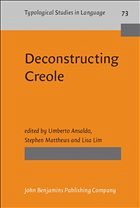Deconstructing Creole is a collection of studies aimed at critically assessing the idea of creole languages as a homogeneous structural type with shared and peculiar patterns of genesis. Following up on the critical discussion of notions of ‘creole exceptionalism’ as historical and ideological constructs, this volume tests the basic assumptions that underlie current attempts to present ‘creole structure’ as a special type, from typological as well as sociohistorical perspectives. The sum of the findings presented here suggests that careful empirical investigation of input varieties and contact environments can explain the structural output without recourse to an exceptional genesis scenario. Echoing calls to dissolve the notion of ‘creolization’ as a special diachronic process, this volume proposes that theoretically grounded approaches to the notions of simplicity, complexity, transmission, etc. do not warrant considering so-called ‘creole’ languages as a special synchronic type.
Table of contents:
- Acknowledgements
- Deconstructing creole: The rationale
- Part I: Typology and grammar
- Creole morphology revisited
- The role of typology in language creation: A descriptive take
- Creoles, complexity and associational semantics
- Admixture and after: The Chamic languages and the Creole prototype
- Relexification and pidgin development: The case of Cape Dutch Pidgin
- Part II: Sociohistorical contexts
- Transmission and transfer
- The sociolinguistic history of the Peranakans: What it tells us about 'creolization'
- The complexity that really matters: The role of political economy in creole genesis
- Creole metaphors in cultural analysis
- General Index
Table of contents:
- Acknowledgements
- Deconstructing creole: The rationale
- Part I: Typology and grammar
- Creole morphology revisited
- The role of typology in language creation: A descriptive take
- Creoles, complexity and associational semantics
- Admixture and after: The Chamic languages and the Creole prototype
- Relexification and pidgin development: The case of Cape Dutch Pidgin
- Part II: Sociohistorical contexts
- Transmission and transfer
- The sociolinguistic history of the Peranakans: What it tells us about 'creolization'
- The complexity that really matters: The role of political economy in creole genesis
- Creole metaphors in cultural analysis
- General Index

